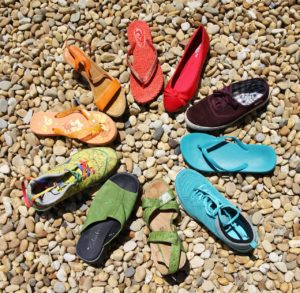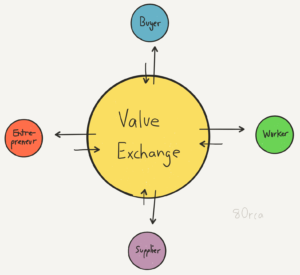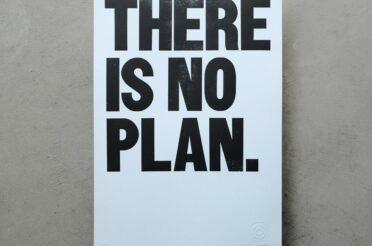 Entrepreneurs fulfill a peculiar role in an economy, and develop particular skills to ply in that role. Recognizing yourself as an entrepreneur means you can give yourself permission to come at things differently. In the same way, recognizing you’re not an entrepreneur will save you a whole lot of heartache.
Entrepreneurs fulfill a peculiar role in an economy, and develop particular skills to ply in that role. Recognizing yourself as an entrepreneur means you can give yourself permission to come at things differently. In the same way, recognizing you’re not an entrepreneur will save you a whole lot of heartache.
But before we can understand who and what an entrepreneur really is, we have to step back and understand the broader function of an economy.
The Function of an Economy
We hear about the “economy” all the time, but it’s one of those embedded realities that everybody knows about, but nobody really knows. (Like we all know what cars are, but very few of us can actually explain how they work.)
The origin of the word economy is “oikonomia”, from the Greek “oikos” (for “house”) and “nemein” (for “manage”). So literally taken, “economy” means “household management”. It was the Greek poet Hesiod in his great poem Works and Days, who first described the phenomenon where each of us has a finite set of resources, and must intelligently allocate it among various uses. (We all know that feeling: you need to pay utilities, but you’d also like to take that vacation.) Because of the reality of finite resources, we have to “economize” — which is not code for “cheap”, but describes the process of weighing trade-offs and arriving at our allocation. (For example, we might decide to eat out less for a certain number of months, so we can purchase that airplane ticket instead.)
Now take one household weighing these trade-offs, add it to another 100 million next door neighbors doing the same, and boom: you’ve got yourself a bona-fide, modern-day economy. The combined effect of all those decisions is literally shaping which, and how, and where that society’s resources are being directed, in an almost unseen orchestration through billions of micro-interactions.
An economy, then, is how a society makes the trade-off decisions to direct its resources towards what it values.
Now before we move off the topic of economies, it’s important to know that there’s more than one way to organize an economy. What I’ve described above is loosely a “free market” economy, where the individuals involved are free to make the value judgments and buy/sell decisions, creating a dynamic ecosystem that adapts to ever-evolving circumstances. But one alternative is a “centrally planned” economy, where a state agency is tasked with deciding the value of goods and services, and with making the decisions on which get produced and distributed. (Examples would be the former Soviet Union, as well as Cuba.) The reason this is important, is that entrepreneurs can only thrive, or even exist, in an economy that is free. And the reason why, is tied to the role the entrepreneur plays.
The Role of the Entrepreneur
As we described above, an economy involves people taking their values, applying them to the choice alternatives they have, making a judgement, and then directing their resources (e.g., spending their money). At any one point in time, there’s a set number of choice alternatives available to us, and unless something else comes along, that set number of alternatives will remain the same.
The ‘something else that comes along’, is the entrepreneur. An entrepreneur is an economic change agent: she looks at the existing choice alternatives, considers what’s possible, and decides to create a whole other choice that she thinks is superior. In order to understand this creative act, it helps to break out what a “choice alternative” looks like. I like to call them “value exchanges”, and an entrepreneur creates new value exchanges that look something like this:

If you examine the graphic closely, you’ll notice something strange: everybody who participates in the value exchange, leaves with more value than they came with. It’s the amazing and beautiful consequence of entrepreneurial creativity: good entrepreneurs aren’t re-slicing pieces of the same economic pie, they’re actually enlarging the pie altogether. It’s actually quite mind-blowing: thoughtfully re-arranging resources, can actually increase overall value. The entrepreneur, then, is proposing a better use of the finite resources we have.
To reflect on that phenomenon for a moment: we have all the exact same resources on this planet today that we did at the time of the caveman — nothing new. It’s not too much of a stretch to say, that it’s an entrepreneurial spirit which has progressively experimented down through the centuries, giving us the particular arrangement of those resources today: and because of it, an entirely different planetary experience. God-willing, it’ll be the same spirit which will continue experimenting forward through the centuries yet to come, proposing additional new arrangements that are even more impactful.
So this, then, is the role of the entrepreneur: to take the risk, to test the uncertain hypothesis, and to change how we direct our resources for the better. It requires intuition, imagination, and perseverance, and contributes to the overall human ecology and human experience.
The Freedom of Self-Knowledge
With this understanding of the function of an economy, and the role entrepreneurs play in that economy, we can come at what we do with different eyes. As Robert Sirico states in his book The Entrepreneurial Vocation, we can realize our “greatest contribution lies in making profits, expanding jobs, boosting investment, increasing prosperity — and doing so in a way that promotes a wholesome, stable, and virtuous culture.”
The role of the entrepreneur is not the only one, nor is it the right fit for everyone, but there’s a freedom that comes from recognizing your own self-identity, and how you fit into the broader picture. The team at Elements CPA is energized by this entrepreneurial spirit, and it’s our mission to help entrepreneurs design their business and finances towards a financial strength that truly matters.






